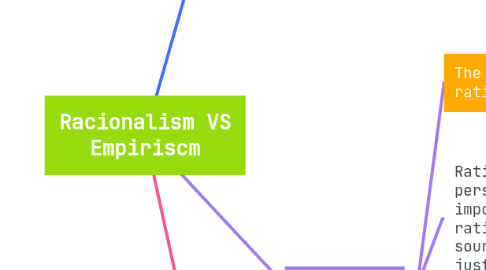
1. Principal Contrast between rationalism and empiricism
1.1. Sources of Knowledge:
1.1.1. Rationalism: Rationalists argue that reason, logic, and innate ideas are the primary sources of knowledge
1.1.2. Empiricism: Empiricists emphasize that sensory experience is the foundation of knowledge.
1.2. Certainty and Necessity
1.2.1. Rationalism: Rationalists contend that knowledge derived through reason is often more certain and necessary than empirical knowledge.
1.2.2. Empiricism: Empiricists acknowledge that empirical knowledge is contingent and subject to interpretation.
1.3. Mathematical and Scientific Knowledge:
1.3.1. Rationalism: Rationalists view mathematical and scientific knowledge as paradigm examples of truths gained through reason
1.3.2. Empiricism: Empiricists acknowledge the importance of empirical observations in scientific inquiry.
2. Racionalism
2.1. The greatest exponent of rationalism.
2.1.1. The greatest exponent of rationalism was René Descartes, who created a rational method to access the truth.
2.2. Rationalism is a philosophical perspective that emphasizes the importance of reason and rationality as the primary sources of knowledge and justification.
2.2.1. Some examples:
2.2.1.1. Any surface that is red is colored.
2.2.1.2. If A is greater than B, and B is greater than C, then A is greater than C.
2.3. Rationalism believes in three paths by which humans can reach knowledge:
2.3.1. DEDUCTION
2.3.1.1. It is the application of specific principles to draw a conclusion.
2.3.2. INNATE IDEAS
2.3.2.1. It is the concept that we are born with fundamental truths or experiences that we bring from other lives.
2.3.3. REASON
2.3.3.1. The reason uses logic to determine a conclusion, being able to use several methods for it.
3. Empiriscm
3.1. Empiricism is a philosophical approach that emphasizes the importance of sensory experience and observation as the foundation for gaining knowledge and understanding about the world.
3.1.1. Some examples:
3.1.1.1. Medical Observations: Doctors diagnosing a patient's condition by observing their symptoms, running tests, and analyzing medical data.
3.1.1.2. Naturalistic Observations: Researchers studying animal behavior by observing animals in their natural habitats
3.1.1.3. Scientific Experiments: Conducting experiments to test hypotheses and gather data based on observations and measurements.
3.2. The primary exponents of empiricism.
3.2.1. John Locke, George Berkeley, and David Hume
